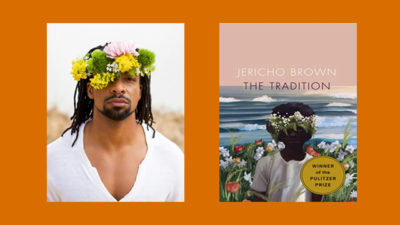 Jericho Brown’s poetry takes inspiration from a wide variety of sources, including Greek myth, American civil rights, and Alabama vernacular. He enlivens traditional forms and invents new ones, like the duplex, a blend of the sonnet, the ghazal (an Arabic form), and the blues poem. His poems are intimate and urgent, rich with love and sorrow and rage. His third poetry collection, The Tradition (Copper Canyon, 2019), won the 2020 Pulitzer Prize.
Jericho Brown’s poetry takes inspiration from a wide variety of sources, including Greek myth, American civil rights, and Alabama vernacular. He enlivens traditional forms and invents new ones, like the duplex, a blend of the sonnet, the ghazal (an Arabic form), and the blues poem. His poems are intimate and urgent, rich with love and sorrow and rage. His third poetry collection, The Tradition (Copper Canyon, 2019), won the 2020 Pulitzer Prize.
Brown read his work and discussed his background and process with poet Amy Lemmon, chair of English and Communication Studies, on Oct. 14 in a conversation entitled Civility and Its Limits: Speaking Out Through Poetry With Jericho Brown. The program, which Lemmon organized, was a highlight of Civility Week, an annual series of events aimed at helping ensure that FIT is a safe, respectful, equitable, and inclusive learning community. This year, all events were held online.
After reading selections from The Tradition, Brown offered advice to emerging poets in the audience. He advised them to “live a big life” and say yes to experience. “I’m not saying, ‘Be risky,’” he clarified. “I’m saying, ‘Take risks.’”
He urged students to read widely and write with discipline. “When you go to bed, you have to be able to say, “What did I do for myself as an artist today?”
He also encouraged poets to find inspiration inside themselves. “I need to be writing the poems of my life, the poems necessary for my soul,” he said. “I don’t need to be writing the poems I think people are going to like, or what’s going to be popular on Twitter. If you bog yourself down in what’s going to sell, you’re not going to write what you’re supposed to be writing.”
He closed by answering an audience question about whether poetry can effect political or social change. “You don’t want to make a poem that is automatically going to change a law,” he said. “But yes, put it out in the world and a lawmaker might read your poem.”
